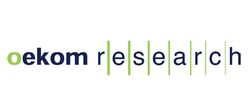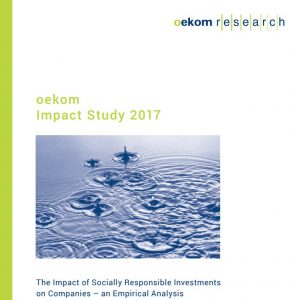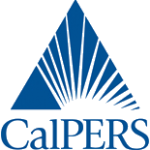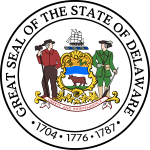Issue 4.1

It’s a question often raised by boards and senior executives, posed to the management team members: What is the impact, if any, of third-party sustainability rating agencies on our position in the capital markets? Oekom, the global sustainability research organization, has been asking that question annually since 2013. And through its published research, answering the question! We share with you today the latest answers to the question.
Top Lines: More company management are seriously looking at their sustainability efforts; more executives are assessing the impact of external ratings on their strategy and performance; more executives are saying that sustainability issues were important for their companies’ future development.
Key Factors: More sustainability rating agencies and more of the companies’ clients are demanding company ESG information.
Two Issues Are In More Intense Focus: Water and climate change. Oekom researchers note that for the 1,700+ (financial industry) signatories to the Principles for Responsible Investment (PRI), the #1 issue is climate change in terms of risk to portfolios.
HIGHLIGHTS OF THE RECENT OEKOM RESEARCH
 More than 91% of surveyed companies think of sustainability as being important. More than half of respondents gave “Very High” priority to sustainable development.
More than 91% of surveyed companies think of sustainability as being important. More than half of respondents gave “Very High” priority to sustainable development.
The #1 driver for corporate execs was the activities of sustainability rating agencies; almost 2/3 also said customer demand [for sustainability information] was a driver for their efforts. And two-thirds of respondents said that customer demand will substantially increase in the future.
“Transparency” of the rating process / and the ratings assigned are “vital” for the rating to have an impact. “Quality” of the rating process is critical, say survey respondents.
The relevance of sustainability in financial market communication is becoming a mainstream activity, as companies are integrating sustainability management information into their broader financial market communications.
Given the above factors, company managements are seeing an impact on corporate strategies as third party ESG analysis and ratings exert “strong” and “very strong” impacts on strategy-setting.
Almost all of the respondents said the requirements of the rating agencies was a good “early warning system” to help recognize environmental (E) and social (S) sustainability trends (9-of-10 companies thought so).
And 6-in-10 respondents agree with this statement: “Sustainability analyst expectations communicated during the rating process helps companies design appropriate sustainability management systems.”
Even more — 7-in-10 respondents — use the external ratings as an internal control mechanism and benchmark tool to rate the success of their efforts. And the same number of companies regularly use the ratings as benchmark tool against their industry peers.
As the U.N. Sustainable Development Goals (SDGs) are being discussed more frequently now, companies are apparently still wrestling with “how to use” the SDGs with other of their initiatives as a basis for setting strategies.
Less than 2-in-10 companies align sustainability management systems with the SDGs and use the goals (and targets) in their sustainability reporting.
But, almost 60% thought that the SDGs would provide motivation to improve their sustainability performance and boost commitment to implement the SDGs…what would help is an “SDG Label” to use with investor audiences.
Note that here at G&A Institute we have been analyzing corporate sustainability reports for the past year to identify companies’ adoption of the SDGs in the new GRI Standards reporting. We’ll include results in this platform.
For a small percentage of companies, the third-party assessments of their sustainability performance impacts on entire management compensation (only 10%); 23% said only select management positions are affected by the ratings.
HISTORY OF THE STUDY
Oekom began looking at the influence that “sustainable capital markets’ requirements” have on corporate sustainability management in 2013 and continued this empirical analysis on an annual basis. A clear majority of companies being surveyed said (and continue to say) that sustainability ratings agencies’ (response and disclosure) requirements were a decisive factor in the companies’ strategies and actions related to sustainability.
Over the years since the first report, sustainability issues — ESG issues — are playing a much more prominent role in the capital markets, with greater investor emphasis on corporate ESG performance.
In some countries — Oekom surveys global companies — company managers are also responding to or complying with directives and mandates for reporting (such as the Green Growth Act in France).
Oekom sees this as “ESG Mainstreaming,” which is on the rise around the world.
Some stock exchanges are using Oekom Research services for their listed company activities and development of investable products. An example is the Hanover (Germany) Stock Exchange, which developed the “Global Challenge Index (GCX), launched in 2007, and including just 50 companies.
Those companies selected “make substantial and pioneering contributions in addressing the greatest challenges facing our planet.” (Such as: combating climate change; ensuring supply of drinking water; sustainable forestry; establishing governance structures, and more.)
The stock exchange selects only companies that Oekom rates as “Prime” status in Corporate Rating.
LOOKING AT THE USA
Oekom included in the report the US SIF survey of asset managers (last year), that determined 477 institutional investors, 300 asset managers, and 1,043 municipal investors applied ESG criteria in their analysis and portfolio management. The total of such investments was US$8.10 trillion, or about $1-in-$5 in Assets Under Management by professionals.
At the time of the report preparation, the Global Reporting Initiative (GRI) had more than 42,500 sustainability reports in its global database (dating back to 1999/2000), gathered from close to 11,000 organizations (corporations, institutions, government entities, not-for-profits, etc.)
The purpose of the annual study is to try to analyze the sustainable capital markets’ impact on how companies manage their ESG challenges and performance in “the context of changing landscape”. The benchmark for examining changes is the 2013 report; the aim of the research among other purposes is to identify and quantify the impact of third-party sustainability analysis and ratings on corporate strategy-setting.
INVESTOR FOCUS ON CORPORATE SUSTAINABILITY
The report notes that in May 2017, more than 300 investors signed a letter encouraging the G7 government leaders and G20 leaders to stick to commitments made at the Paris COP 21 meeting (keeping global climate change rise to 2 degrees C) — their combined Assets Under Management was US$19 trillion. The Report’s foreword was by Fiona Reynolds, Managing Director of PRI.
ABOUT OEKOM
Oekom Research is an analytical and ratings firm for sustainable investing. More than 160 asset managers and owners incorporate Oekom’s research in their investment decision-making. Oekom’s work influences EUR 1.5 trillion in Assets Under Management.
The Oekom Universe for research is 6,200 issuers comprising 5,500 corporate and 700 sovereign issuers. These are (1) large-cap publicly-listed companies; (2) small- and medium-sized publicly-listed companies in industries such as renewables and energy efficiency, recycling, water treatment and education; (3) bond issuers that are not publicly-listed, such as regional banks, the World Bank, railway operators.
The resulting Corporate Rating provides investors with a comprehensive assessment of a company’s sustainable performance and future viability. Each sector has more than 100 individual criteria to be considered, many of these are weighted and industry-specific.
For the 2017 survey, 3,660 companies were contacted (worldwide) in June 2017 and invited to take part; 475 companies did so. In the first study (2013), many of the companies were headquartered in Germany and France.
For 2017, companies in the USA and Japan are significant responders. The largest cohort in responding was the global financial services industry, which is also the largest segment of the Oekom Universe. The next largest are real estate, pharmaceuticals, and healthcare companies.
About half of the respondents are UN Global Compact signatories and about 1-in-5 are signatories of the UN PRI.
There are 70 analysts doing the work, most in the home office in Munich. There are offices in New York, Paris, and London.
The editorial team for the research project included Dieter Niewierra, Lisa Kim Breitenbruch, and Theres Scherzinger.
LOOKING TO THE FUTURE
Note that 61% of respondents said: “Demands from sustainability rating agencies and research firms have motivated their company to address Sustainability.” And those inquiries are expected to rise in the future. And, almost 70% of respondents said “Demands from customers” will become the most important driver of Sustainable Development at the company in the future.”
G&A TEAM COMMENTS
There is a steady expansion of (1) customer and third-party analytics and rating firm queries presented to company management and (2) a rising rate of response to these queries. A significant amount of major customers are now surveying their supply chain partners to determine their sustainability efforts; and, the volume and depth of information sought by independent sustainability analytics firms are presenting challenges to companies (in their response efforts).
The most important (in our opinion) of the queries coming to companies would include RobecoSAM Group’s “Corporate Sustainability Assessment,” the CSA (annually); outstanding performers are considered for inclusion in the Dow Jones Sustainability Indexes, managed by the firm.
Also, Sustainalytics, which provides information to the Bloomberg terminal, and is the research provider to Morningstar, which has begun to rate mutual funds’ sustainability performance.
And we would include MSCI in this most important group as well, which generates several analyst reports on ESG information covering many companies, and utilizes its research to create several important ESG indexes.
Many customers are using EcoVadis for querying suppliers. Verité is another firm used by customers.
CDP is steadily expanding its database of information of interest to investors, gathering corporate data and information on GHG emissions, water, forestry products, supply chain, and select industries and sectors.
Standard & Poor’s is including corporate ESG information in its processes; lenders and investors use S&P for their evaluation of transactions.
There are a dozen more important independent ESG research, ratings, rankings firm to be considered for engagement by company management, depending on the company, its industry, and sector, customer base, investor base, and other factors.
Oekom is one of these, especially if a public company has or desired to have European and other non-US investors interested in their equity and bond issues.
What can you do in light of this research?
For starters, you can review your MSCI ESG Report to see what this influential organization (advising many investors) has to say about your company. Send an email to: corporate_communications@msci.com.
That’s a good first step! Of course, there is a lot more information out there about your company — knowing “what” it is and “what” is says (in telling your company story) is important…in term of reputation and valuation.
REFERENCES
Oekom Impact Study 2017 – available at:
http://oekom-research.com/homepage/english/oekom-Impact%20Study%202017_EN.pdf
If you are interesting in learning more about the work of Governance & Accountability Institute and its portfolio of resources, tools and service offerings, please click here





